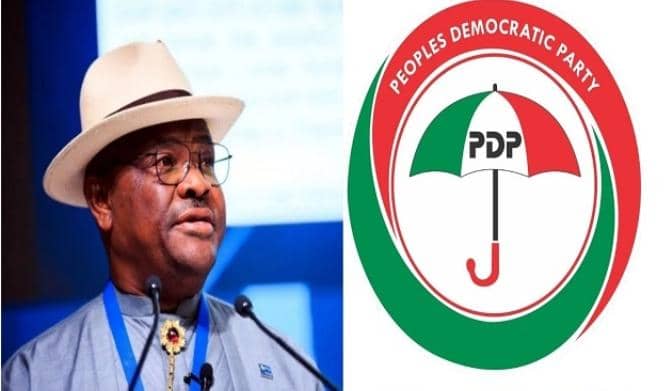By Sakariyah, Ridwanullah
The Peoples Democratic Party (PDP), once the dominant political force in Africa, is teetering on the brink of collapse. As Nigeria charges towards the 2027 general elections, the PDP, which should be leading the opposition, is instead hemorrhaging key members and battling a fierce internal war. The question is no longer who the PDP will field, but whether it can even hold itself together.
The party’s crisis reached a new peak in late 2025. Political circles became tense following a wave of reported defections from the PDP to the ruling All Progressives Congress (APC). Former Rivers State Governor and current FCT Minister, Nyesom Wike, openly stated that the ongoing crisis was pushing the party towards self-destruction, warning that the actions of certain governors and party leaders would “bury this party,” as reported by Punch Newspapers in October 2025. This sends signals to the opposition’s deep, self-inflicted wounds, further compounded by the loss of governors.
READ ALSO: Governors reject Wike’s expulsion as PDP convention crisis deepens
One major example of this trend occurred in October 2025, when Governor Peter Mbah of Enugu State defected to the APC. This loss, in a traditional PDP stronghold, demonstrates the party’s failure to protect its base, with the governor citing a need to better align the state with the centre for collaboration and growth, according to Punch Newspapers. The defection trend has continued to accelerate throughout 2025, significantly weakening the party’s hold on power nationwide.
In spite of this dwindling strength, the PDP still maintains control in a few key states like Adamawa (under Governor Ahmadu Fintiri) and Bauchi (under Governor Bala Muhammed). However, this limited stability is overshadowed by crippling losses; the party’s number of governors and its presence in the National Assembly (currently holding 37 out of 109 Senate seats) has shrunk dramatically since its peak in 2007. This makes its role as the primary check on the executive increasingly ineffective.
In fact, the PDP’s current woes are the culmination of crises dating back to its 2015 ousting, that is, the first time an incumbent party was defeated in Nigerian history. Since then, the party has struggled to reconcile powerful internal factions and has been ruthlessly exploited by the ruling APC, which has adopted an aggressive “poaching” strategy. This constant haemorrhaging has accelerated the party’s perception as a “dwindling opposition.” Loyal PDP chieftain Bode George expressed his disappointment in April 2025, stating that he was saddened that some governors were considering decamping to the APC despite riding into power on the PDP’s goodwill, a powerful warning reported by Arise TV.
Faced with existential defeat, the only viable option for the PDP may be a mega-merger with other opposition forces. Coalition talks have been confirmed by various opposition leaders. Former Vice-President Atiku Abubakar (PDP’s 2023 presidential candidate) confirmed during a March 2025 press conference that he and other opposition leaders were planning to form a coalition, seeking to challenge the APC dominance
Inevitably, the focus of this coalition has turned to Peter Obi, the popular former Labour Party candidate. The PDP has openly acknowledged wanting him back, with party leaders stating in July 2025 that “Peter Obi is our product,” as reported by News Central TV. However, both Peter Obi and Atiku Abubakar have denied reaching any formal joint ticket deal for 2027, maintaining that while coalition talks are ongoing, they are focused on issues rather than positions, as reported by Africa Check in May 2025.
Beyond this political drama, the opposition faces deeper, often underreported issues. Defections are rarely about ideology alone; the APC’s power at the federal level grants it access to financial resources the PDP cannot match which now continues to fuel speculation that financial inducements are funding the defections. Moreover, the PDP’s internal disputes have constantly spilled over into the courts. These judicial challenges are being used by factional actors to undermine the convention process, which is scheduled for November 15 and 16, 2025, in Ibadan, according to News Central TV. This constant judicial interference creates uncertainty and weakens the party’s foundational structure.
In the face of these challenges, analysts often point out that electoral integrity is crucial. Their reports highlight how systemic flaws can tactically disenfranchise voters in areas considered opposition strongholds. This means that even if the PDP manages to unite, it faces a tough environment shaped by institutional weaknesses and financial disparity.
READ ALSO: PDP expels Wike, Fayose, Anyanwu, Ajibade, others for anti-party activities
Now as we speak, the PDP stands at a pivotal moment. The scheduled Ibadan convention is their last clear chance to elect a united leadership and chart a course for 2027. If the party fails to reconcile its powerful internal factions and secure a formidable alliance, especially one involving Peter Obi, the APC’s clear coast will likely cement a one-party dominance in Nigeria. Conversely, if a mega-merger is successfully pulled off, then the PDP could instantly be revived as a powerful, multi-regional contender. But until then, Nigeria’s main opposition remains weakened, fractured, and struggling in a fight for its very existence.



